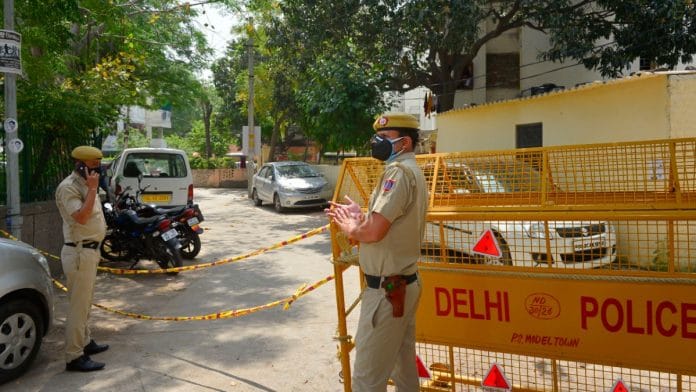New Delhi: A Delhi policeman testing positive from Covid-19 again, within one and a half month of having “recovered”, has left doctors and health experts in the city searching for possible explanations.
The 50-year-old had first tested positive on 15 May and was treated at the Indraprastha Apollo Hospitals until 22 May. Though he was asymptomatic throughout, all positive patients had to be hospitalised at that time.
After he was discharged on 22 May, he was tested on 25 May, on medical advice, and his RT-PCR test came back negative. He rejoined duty thereafter.
On 10 July, however, the policeman complained of pain in his chest and approached doctors again at the same hospital. By 13 July, he had also developed fever. He underwent both the rapid antigen as well as an RT-PCR tests, and both came back positive. He was once again admitted to hospital on 15 July, and his situation is now being monitored.
Dr Rajesh Chawla, senior consultant, respiratory and critical care medicine, Apollo Hospitals, confirmed the sequence of events.
“He is stable otherwise, but we tested him again on 20 July and he is still positive,” Chawla told ThePrint, adding that this was a “first-of-its-kind” case he had come across.
The doctor added, “Given that he underwent RT-PCR the first time and this time both antigen and RT-PCR tests, it is difficult to say (what this could mean) as he has tested positive each time.”
He added that it could be a case of false positive from the first time since the patient had no symptoms then, but it appeared to be the first case of “reinfection” for them since it happened in less than a month and a half after recovery.
A false positive in medical testing is when there is an error in data reporting wherein a test result improperly indicates presence of a condition, such as Covid-19 in this case, when it’s actually not present.
Also read: In Delhi, rapid antigen tests fuel spurt in testing but false negatives a worry
‘Could be a case of false positive’
While experts at the Centre for Cellular and Molecular Biology (CCMB) in Secunderabad say the immunity against the virus also stays in the body for a while, unlike the HIV, coronavirus even though is a latent virus and integrates with the genome of the host, doesn’t show anything like that.
Dr Rakesh Mishra, director, CCMB, Secunderbad, said, “There are two kinds of immunity in a person, one is innate immunity and the other is acquired immunity. So the level of immunity could also play a role in fighting the infection.”
Having heard of such a case for the first time himself, he further explained that if the patient had no symptoms the first time then it impacts the kind of antibodies the body develops as well. “The stronger the symptoms, the more or better the antibodies that the body is likely to develop,” Dr Mishra told ThePrint, adding that while it could be a case of false positive the first time, it was difficult to rule out “reinfection” since all his tests had repeatedly come positive.
Dr Jugal Kishore, head of community medicine, Safdarjung Hospital, however, said given the huge number of cases across the country, one such case was not enough to depict a trend.
“It could even be a case of mixing of sample, sporadic data, we don’t know… So we can’t exactly say it is a case of reinfection by looking at one such case ,” he said.
A study published in June found that antibodies to one part of the virus fell to undetectable levels within three months in 40 per cent of asymptomatic people.
The New York Times stated that the study, which has not yet been published in a peer-reviewed journal, showed that neutralising antibodies — the powerful subtype that can stop the virus from infecting cells — declined sharply within a month.
Not the first case in Delhi
This isn’t the first time that Delhi has had a patient testing positive after recovering.
A nurse employed at the Hindu Rao Hospital tested positive last week after having recovered from the virus earlier.
Talking to ThePrint, the nurse who has had no major symptoms both the times and is now in home isolation, said, “I underwent the RT-PCR test both times. I even resumed duty in the Covid-19 ward after I recovered the first time.”
It was only after she was tested as part of mandatory procedure that she tested positive again. While doctors at the hospital refused to comment, sources in the north municipal authorities said most likely it was the “dead virus” left in her body from the previous infection.
For virologist and CEO of Wellcome Trust DBT India, Dr Shahid Jameel, the next few days are crucial in monitoring both patients.
He believes it is very unlikely that Covid-19 can happen again to a patient. “If someone who had been infected with the coronavirus didn’t develop antibodies for the pathogen, a person’s T-cells and B-cells could fight off reinfection,” he said.
South Korea was the first country in the world to have raised concerns about patients who have recovered testing positive again.
The country’s experts had then said remnants of the virus at times could remain at levels too low to be detected by a given test.
Also read: Covid death data mismatch continues in Delhi — difference of over 500 in govt, funeral figures






